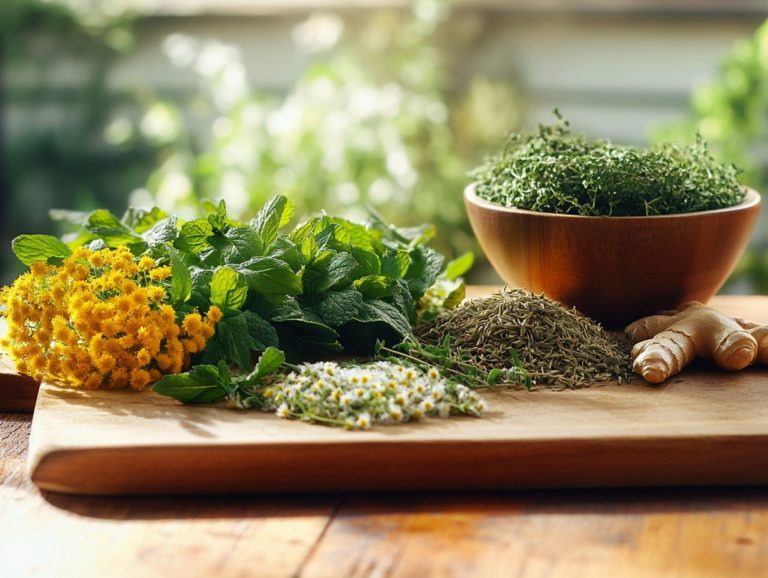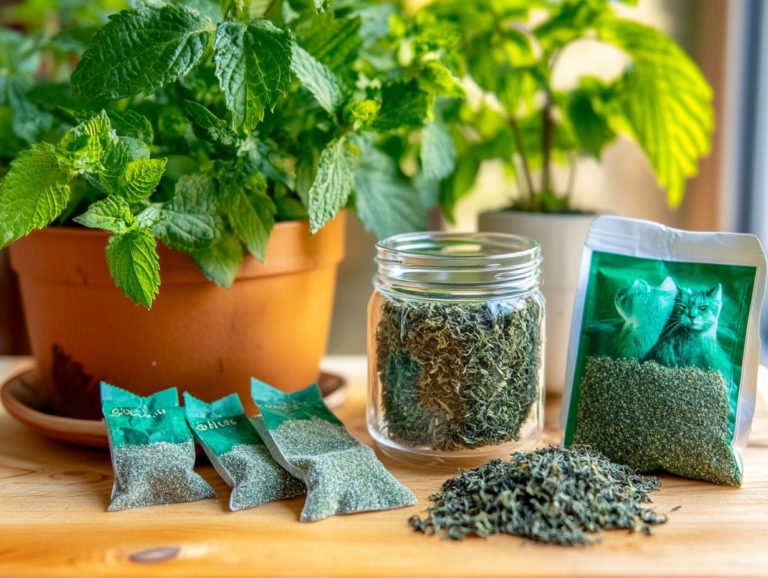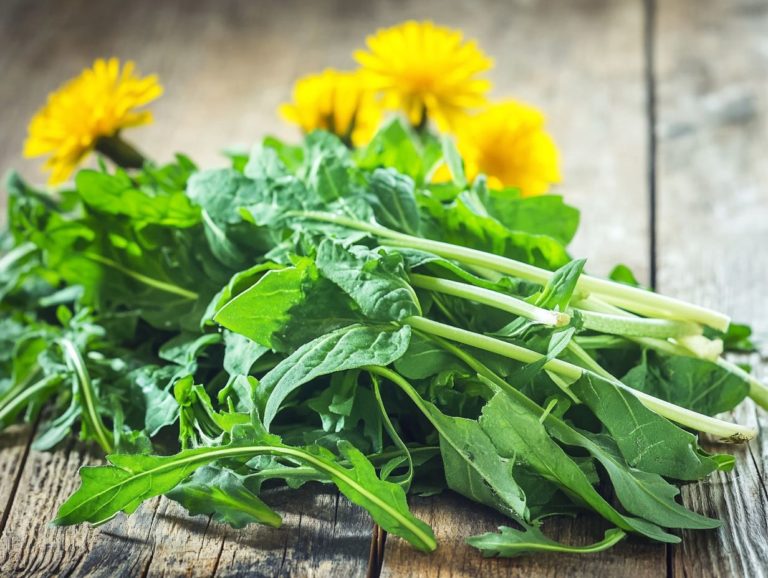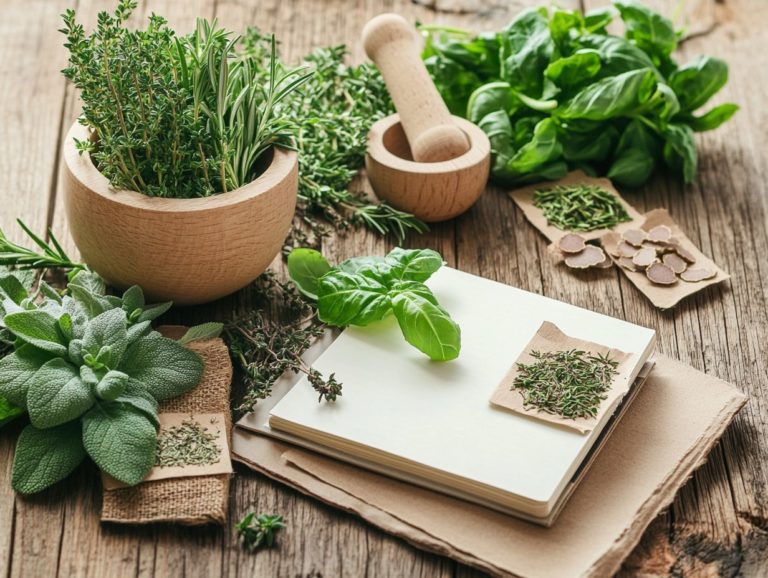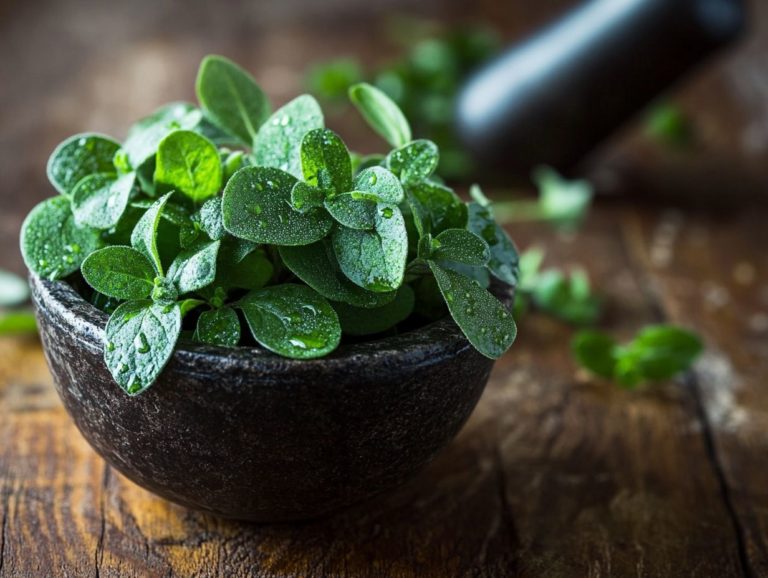5 Must-Try Herbs for Digestive Health
Digestive health is essential for your overall well-being, and nature provides a wealth of herbs to support it.
Consider these five powerful herbs ginger, peppermint, fennel, turmeric, and chamomile that can elevate your digestive experience. Each of these herbs works wonders for your gut and offers various forms and uses to address specific digestive issues.
You ll also find valuable tips for incorporating these herbs into your diet, utilizing a range of herbs like cinnamon and psyllium.
Ready to boost your digestion with nature s help? Let s dive in!
Contents
- Key Takeaways:
- 1. Ginger
- 2. Peppermint
- 3. Fennel
- 4. Turmeric
- 5. Chamomile
- How Do These Herbs Promote Digestive Health?
- Frequently Asked Questions
- What are the 5 must-try herbs for digestive health?
- Why is ginger considered a must-try herb for digestive health?
- How does peppermint benefit digestive health?
- What benefits does fennel offer for digestive health?
- How can chamomile improve digestive health?
- Why is turmeric recommended for digestive health?
Key Takeaways:
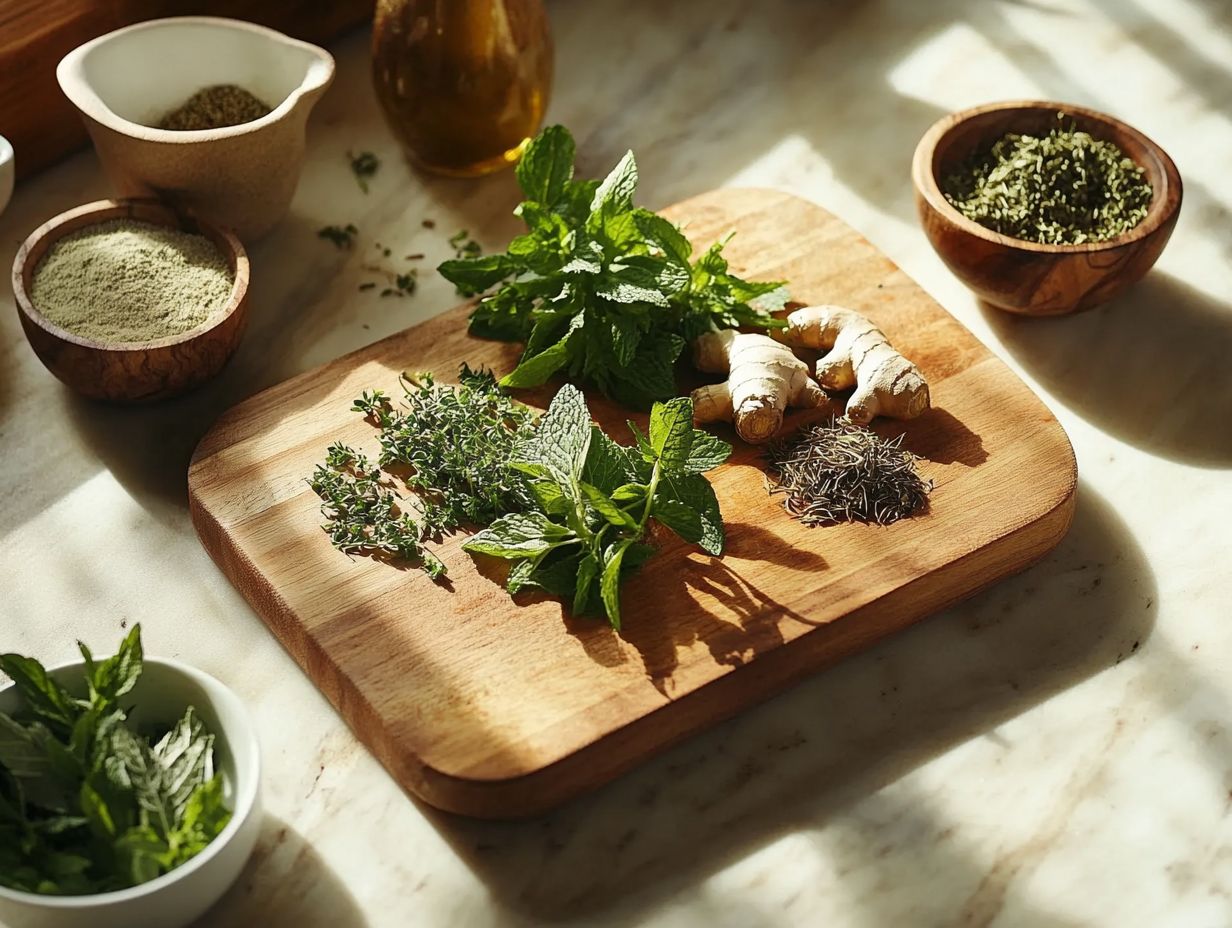
Here are the key benefits of these herbs for your digestion:
- Ginger can help reduce nausea and inflammation in the digestive system.
- Peppermint can relieve bloating and cramping by relaxing the muscles in the digestive tract and is particularly effective in supporting gut health.
- Fennel can aid in digestion and reduce gas and bloating, making it a popular choice in Ayurveda.
1. Ginger
Ginger, a remarkable herb celebrated for its myriad health benefits, plays a vital role in promoting digestion and overall digestive health.
It also gives your energy levels a boost. This makes it a favorite in both natural remedies and culinary delights across the globe.
The active compounds in ginger, particularly gingerol, are key players in alleviating digestive issues. They enhance nutrient absorption and support gut health, underscoring ginger’s importance in both traditional and contemporary wellness practices.
You might find ginger exceptionally beneficial for soothing nausea, whether it stems from morning sickness, motion sickness, or the side effects of chemotherapy.
This herb can even stimulate your appetite, making it an excellent companion for anyone recovering from illness or grappling with a diminished desire to eat.
Incorporating ginger into your daily routine can be both easy and enjoyable. You can brew it into warm teas, blend it into smoothies, or toss it into salads for a delightful zing.
For those constantly on the move, ginger supplements are readily available, ensuring that you can tap into its digestive benefits without any fuss.
2. Peppermint
Peppermint is a remarkable herb that deserves a spot in your wellness toolkit.
Renowned for its soothing effects on the digestive system, it effectively alleviates gastrointestinal distress and promotes gut health.
By relaxing the muscles of the digestive tract, peppermint facilitates smoother digestion and helps relieve discomfort.
If you’re grappling with bloating or irritable bowel syndrome (IBS), peppermint can be your natural ally. It reduces contractions in the gut, easing the discomfort that often accompanies these conditions.
You can enjoy peppermint in several delightful forms. A fragrant cup of peppermint tea not only offers a comforting experience but also provides therapeutic benefits.
Alternatively, peppermint oil, often celebrated in aromatherapy, can alleviate symptoms when applied topically in a diluted form.
For those who prefer convenience, peppermint capsules are an excellent option, delivering the herb’s digestive advantages without any fuss or preparation.
3. Fennel
Fennel, with its aromatic allure and distinctive taste, is celebrated for its remarkable ability to support digestion and maintain digestive health.
It works wonders by reducing bloating, gas, and various digestive discomforts, all thanks to its treasure trove of beneficial compounds like anethole, which also promotes gut health.
This herb has a rich history in traditional remedies, treasured for its soothing properties that ease digestive issues.
To reap these benefits, consider weaving fennel into your meals by:
- Adding its crunchy bulbs to vibrant salads
- Roasting them alongside your favorite vegetables
- Infusing the seeds in your herbal teas
Not only does this versatile herb elevate your culinary creations, but it can also foster a sense of comfort after enjoying heavier dishes.
By blending fennel with other digestive aids like ginger or peppermint in a warm tea, you can craft a soothing concoction that relaxes your digestive system and enhances your overall well-being. Additionally, exploring 5 herbs for natural pain relief can further support your health journey.
4. Turmeric
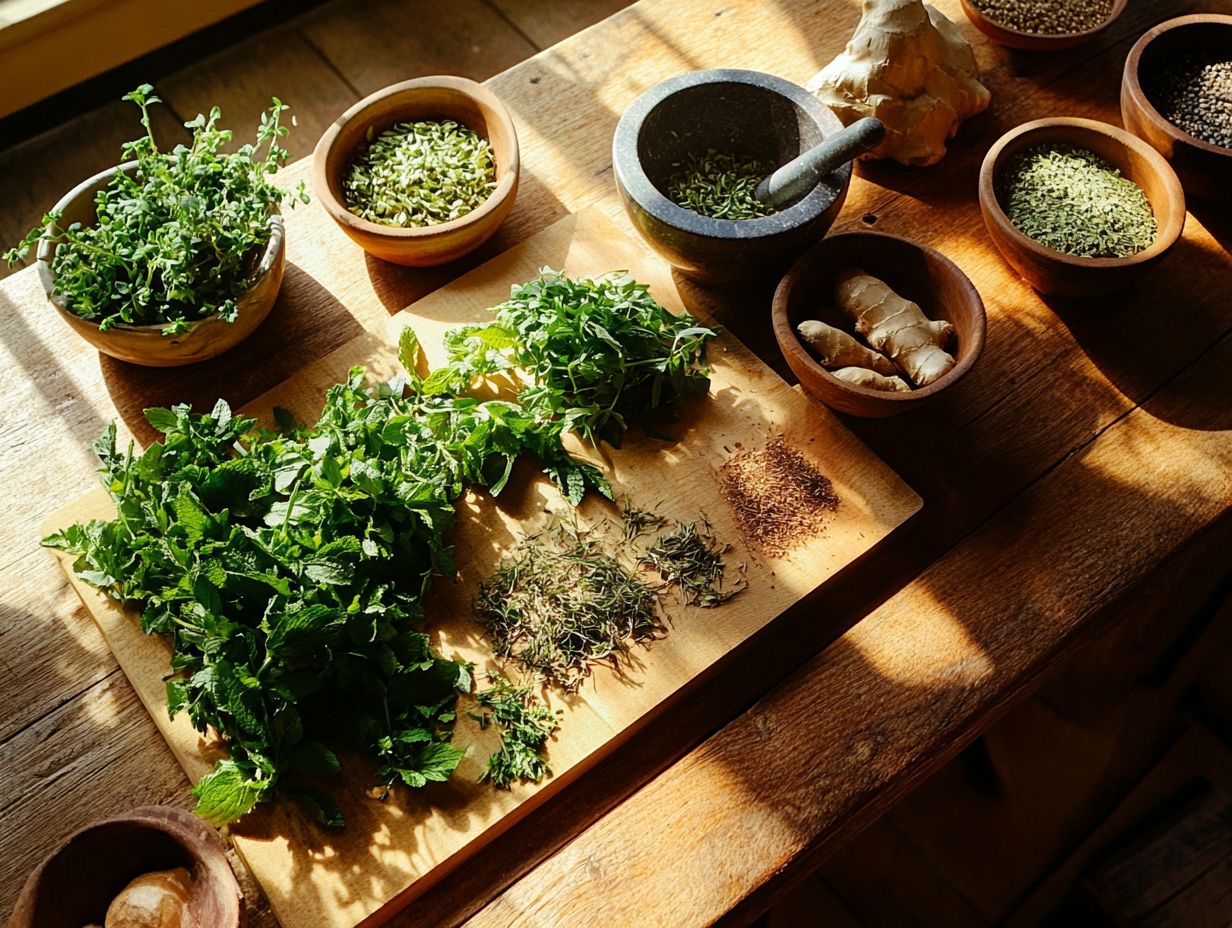
Turmeric attracts attention with its bright color and ability to support digestion. Thanks to its active compound, curcumin, it offers powerful benefits by helping reduce swelling and pain, enhancing your energy levels and gut wellness.
These qualities work wonders for soothing your digestive tract and easing bloating. You can easily add turmeric to your meals, tossing it into curries to not only enhance flavor but also enjoy its health perks.
For a refreshing twist, blend a teaspoon of turmeric into your morning smoothies for a nutrient boost and a touch of golden charm. Alternatively, create a warm cup of golden milk combining turmeric with milk and spices for a comforting drink that promotes better digestion.
5. Chamomile
Chamomile is a gentle powerhouse! It is renowned for its calming properties that enhance digestion and gastrointestinal health. This herb soothes stomach irritation and boosts energy levels through its mild effects.
Sipping a warm cup of chamomile tea is a comforting way to unwind while alleviating digestive discomfort.
If you prefer a more concentrated option, chamomile extracts can be added to smoothies or taken as capsules. The soothing scent of chamomile shines in aromatherapy, creating a tranquil atmosphere that promotes restful sleep.
Don’t miss out on adding chamomile to your wellness rituals for instant relief!
How Do These Herbs Promote Digestive Health?
The combined power of herbs like ginger, peppermint, fennel, turmeric, and chamomile is vital for promoting optimal digestive health. These botanicals offer impressive therapeutic benefits that support your overall well-being.
Together, these herbs harmonize to alleviate common digestive issues such as bloating, gas, and indigestion. For example, ginger stimulates digestive enzymes, improving nutrient absorption, while peppermint relaxes the muscles of your gastrointestinal tract, relieving cramping and discomfort.
Fennel seeds are celebrated for their ability to reduce bloating and flatulence, supported by studies showcasing their carminative properties.
Turmeric not only helps reduce inflammation but also nurtures a healthy gut microbiome, essential for digestive health. Lastly, chamomile’s soothing qualities calm an upset stomach, highlighting the significance of 5 common herbs with healing properties in both traditional practices and contemporary wellness.
What Are the Different Forms of These Herbs and How to Use Them?
These herbs come in various forms, including teas, capsules, essential oils, fresh or dried spices, and aloe vera, giving you plenty of flexibility to incorporate them into your daily routine for optimal digestive health.
Steeping herbal teas allows beneficial compounds to infuse into water, creating a soothing elixir that enhances digestion after meals. Alternatively, using powdered forms in smoothies or sprinkled over your favorite dishes offers a quick health boost with minimal effort.
Tinctures provide a concentrated option, perfect for those seeking potent effects in smaller doses. Using fresh herbs in salads or as garnishes not only elevates flavor but also maximizes their health benefits.
By experimenting with these various forms, you can discover the most enjoyable ways to support your digestive system.
What Are the Potential Side Effects of These Herbs?
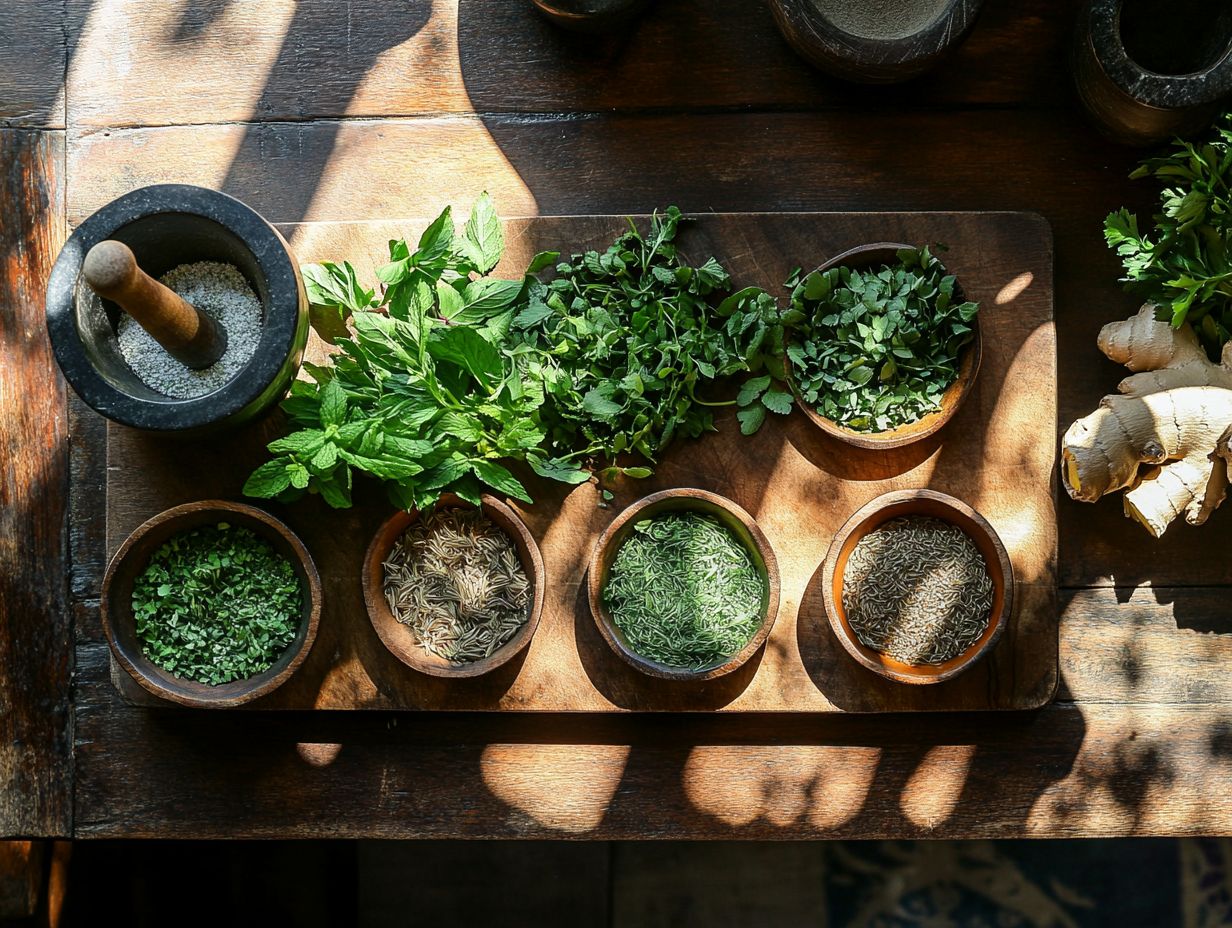
The herbs mentioned are generally safe and beneficial for digestion. However, they may cause side effects for some individuals.
Possible issues include allergies, gastrointestinal discomfort, and interactions with medications. It s important to approach their use with careful consideration.
Each person’s body responds uniquely to herbal remedies. Factors like age, existing health conditions, and genetics can influence these reactions.
Some may experience mild nausea or headaches when trying new herbs. Consulting a healthcare provider before starting any herbal regimen is essential.
They can provide personalized guidance and help you avoid adverse reactions, paving a safer path toward improving your digestive health.
Can These Herbs Help with Specific Digestive Issues?
Yes, these herbs can assist with various digestive issues like nausea, bloating, and gastrointestinal inflammation. Each herb has unique properties tailored to different concerns.
Take ginger, for example. It s often recommended for alleviating nausea. A study in the Journal of Complementary and Integrative Medicine found it significantly relieved symptoms in participants.
Peppermint is renowned for soothing bloating and gas. Its menthol content helps relax the gastrointestinal tract, and it s often used in Ayurvedic practices for digestive balance.
Many people report quick relief from peppermint tea or oil, making it a comforting remedy.
Lastly, turmeric is celebrated for its anti-inflammatory properties. This golden spice eases gastrointestinal inflammation and promotes gut health.
Its active compound, curcumin, is noted for improving energy levels. Research highlights turmeric’s effectiveness in reducing discomfort.
These herbs showcase their strengths and underscore the power of nature in addressing common digestive challenges.
What Are the Precautions to Take When Using These Herbs?
When considering these herbs for digestive health, take specific precautions. Understand potential allergies and be aware of medication interactions.
Consult with a healthcare provider to ensure safe use. This helps identify suitable herbs and determine the correct dosage for your needs.
Familiarize yourself with each herb’s properties. By following prescribed dosages, you can minimize risks while maximizing the benefits of herbal use!
How Can These Herbs Be Incorporated into a Healthy Diet?
Incorporating herbs into your healthy diet is both enjoyable and beneficial. Get creative with your meals by adding these vibrant herbs!
Imagine how fresh basil can elevate a simple tomato salad. Dried oregano adds a delightful aroma to your pasta dishes.
You might consider blending mint leaves into a refreshing smoothie. Alternatively, prepare a soothing herbal tea infused with chamomile and lemon balm.
Another idea is to sprinkle parsley over roasted vegetables. Mixing it into a vibrant chimichurri sauce for grilled meats is also a great option.
By exploring these creative culinary uses, such as adding bael leaf in desserts or using aloe vera in smoothies, you can savor the delicious taste of these herbs. Enjoy their various health benefits throughout your day!
Frequently Asked Questions
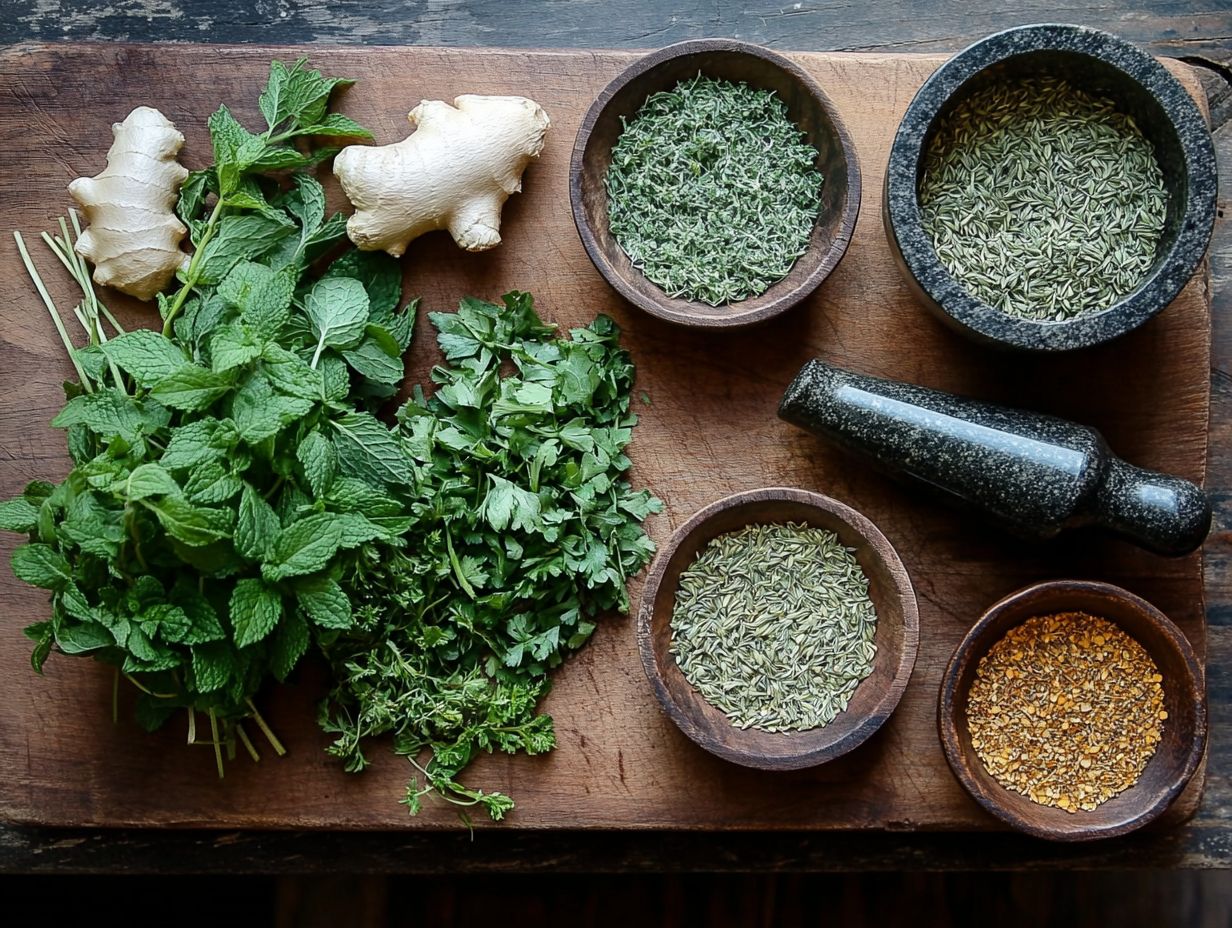
What are the 5 must-try herbs for digestive health?
The 5 must-try herbs for digestive health are ginger, peppermint, fennel, chamomile, and turmeric. Considering rosemary may also support digestion.
Why is ginger considered a must-try herb for digestive health?
Ginger has been used for centuries to aid digestion and relieve stomach discomfort. It contains compounds that stimulate digestive enzymes and helps reduce inflammation in the digestive tract.
How does peppermint benefit digestive health?
Peppermint relaxes the muscles in the digestive tract, helping to relieve bloating, gas, and stomach cramps. It also has anti-inflammatory properties that reduce inflammation in the digestive system.
What benefits does fennel offer for digestive health?
Fennel acts as a natural muscle relaxant, helping to reduce bloating, cramping, and gas. Its high fiber content also aids in regular bowel movements.
How can chamomile improve digestive health?
Chamomile is known for its calming properties, which help reduce stress and anxiety that may contribute to digestive issues. It soothes and heals the digestive tract.
Why is turmeric recommended for digestive health?
Turmeric contains curcumin, which has anti-inflammatory effects that can reduce inflammation in the digestive system. This helps improve overall digestive health.
Experiment with these herbs today and discover the joy of enhanced flavors and health benefits!

